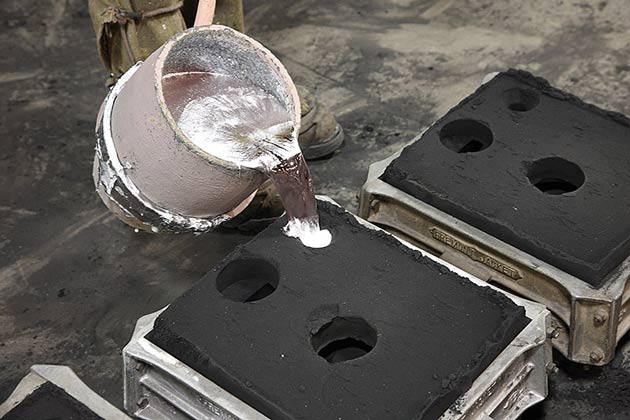Top Guidelines Of Stahl Specialty Company
Top Guidelines Of Stahl Specialty Company
Blog Article
An Unbiased View of Stahl Specialty Company
Table of ContentsFacts About Stahl Specialty Company UncoveredThe Main Principles Of Stahl Specialty Company The Definitive Guide for Stahl Specialty CompanyThe Stahl Specialty Company PDFsThe 8-Minute Rule for Stahl Specialty Company
The subtle difference exists in the chemical web content. Chemical Comparison of Cast Aluminum Alloys Silicon promotes castability by decreasing the alloy's melting temperature and boosting fluidity throughout spreading. It plays a vital role in permitting detailed molds to be loaded properly. Additionally, silicon adds to the alloy's stamina and wear resistance, making it important in applications where resilience is vital, such as automobile components and engine components.It additionally enhances the machinability of the alloy, making it simpler to refine into ended up products. In this method, iron adds to the general workability of light weight aluminum alloys.
Manganese contributes to the toughness of light weight aluminum alloys and enhances workability. It is commonly used in wrought light weight aluminum products like sheets, extrusions, and profiles. The existence of manganese aids in the alloy's formability and resistance to fracturing throughout construction procedures. Magnesium is a light-weight element that offers stamina and impact resistance to aluminum alloys.
It permits the production of lightweight components with exceptional mechanical homes. Zinc improves the castability of light weight aluminum alloys and aids regulate the solidification process throughout spreading. It boosts the alloy's toughness and hardness. It is typically located in applications where intricate shapes and fine information are needed, such as attractive castings and specific automobile parts.
How Stahl Specialty Company can Save You Time, Stress, and Money.
Since aluminum-silicon alloys have excellent spreading residential properties, high gas residential properties, basic processes, and superb deterioration resistance, aluminum-silicon alloys are most frequently utilized in the die-casting industry in the house and abroad. At the very same time, aluminum-silicon alloys are likewise relatively early and extensively acknowledged alloys developed and made use of in die-casting. After continual research study and improvement, many of the present international mainstream aluminum-silicon alloys have actually been settled and are nothing greater than A356, A360, A380, ADC12, B390, and A413.
The main thermal conductivity, tensile strength, return strength, and prolongation differ. Select ideal resources according to the efficiency of the target product generated. Among the above alloys, A356 has the highest possible thermal conductivity, and A380 and ADC12 have the most affordable. The tensile limitation is the opposite. A360 has the finest yield strength and the highest prolongation rate.

Getting My Stahl Specialty Company To Work
In accuracy casting, 6063 is well-suited for applications where detailed geometries and high-quality surface coatings are vital. Examples consist of telecommunication enclosures, where the alloy's premium formability enables smooth and cosmetically pleasing layouts while maintaining structural integrity. In the Illumination Solutions sector, precision-cast 6063 components develop stylish and efficient illumination fixtures that need complex forms and good thermal efficiency.
(https://anotepad.com/note/read/k3dhi827)
It causes a finer surface coating and better corrosion resistance in A360. Furthermore, the A360 exhibits premium elongation, making it suitable for complicated and thin-walled elements. In precision spreading applications, A360 is fit for industries such as Customer Electronic Devices, Telecommunication, and Power Devices. Foundry. Its improved fluidity permits elaborate, high-precision parts like smart device casings and communication device real estates.

In precision casting, light weight aluminum 413 shines in the Consumer Electronic Devices and Power Devices industries. It's typically made use of to craft intricate elements like smart device housings, electronic camera bodies, and power device coverings. Its precision is impressive, with limited resistances as much as 0.01 mm, guaranteeing perfect product assembly. This alloy's remarkable deterioration resistance makes it an excellent selection for outside applications, guaranteeing lasting, durable items in the mentioned sectors.
Some Ideas on Stahl Specialty Company You Need To Know
The light weight aluminum alloy you pick will significantly impact both the casting procedure and the homes of the final item. Due to the fact that of this, you have to make your choice very carefully and take an informed method.
Identifying the most appropriate aluminum alloy for your application will mean weighing a wide selection of features. The very first group addresses alloy attributes that affect the manufacturing procedure.
The alloy you select for die casting directly impacts numerous facets of the casting procedure, like how very easy the alloy is to deal with and if it is susceptible to casting problems. Hot cracking, also called solidification fracturing, is a common die spreading flaw for light weight aluminum alloys that can cause internal or surface-level rips or cracks.
The 10-Minute Rule for Stahl Specialty Company
Certain light weight aluminum alloys are extra at risk to warm cracking than others, and your choice ought to consider this. Casting Foundry. It can harm both the cast and the die, so you should look for alloys with high anti-soldering homes.
Deterioration resistance, which is currently a notable attribute of light weight aluminum, can vary significantly from alloy to alloy and is a vital characteristic to website here consider depending on the ecological conditions your product will certainly be subjected to. Wear resistance is another home typically sought in light weight aluminum items and can set apart some alloys.
Report this page